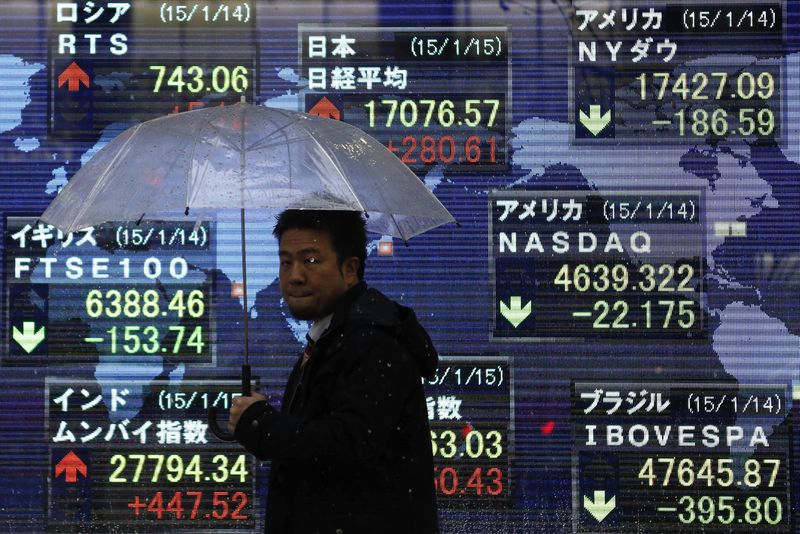By Andrew Galbraith
SHANGHAI, Aug 10 (Reuters) - Asian stock markets fell on Friday despite signs of greater government support for firms in China, with global trade tensions clouding the outlook for demand.
The U.S. dollar was near its highest levels in 13 months, while concerns over disputes with Washington pushed the Turkish lira to record lows and piled pressure on the Russian rouble.
MSCI's broadest index of Asia-Pacific shares outside Japan .MIAPJ0000PUS was down 0.5 percent.
A drop in South Korean tech companies dragged Seoul's Kospi .KS11 down 0.7 percent, as the country's finance ministry highlighted high oil prices and U.S. interest rate hikes as risks. over the tit-for-tat Sino-U.S. trade conflict dragged on shares in China, with the Shanghai Composite index .SSEC dipping 0.1 percent.
But the tech-heavy ChiNext Composite index .CHINEXTP rose 0.6 percent, extending Thursday's strong gains.
Josh Sheng, chief investment officer at Shanghai Tongshengtonghui Asset Management, said that reflected moves by Beijing to boost local firms, such as revamping a government leadership group to focus on supporting homegrown technology. market in China is 'risk on' thanks to government support policies and rising infrastructure investment. I am optimistic about the A-share market for the rest of 2018," he said.
Elsewhere, Japan's Nikkei stock index .N225 fell 0.5 percent even as data showed the country's economy expanded at a faster-than-expected annualised rate in the second quarter. President Donald Trump is pushing Tokyo to sign a free-trade agreement and has threatened to impose higher tariffs on auto imports including those from Japan.
Australian shares .AXJO were flat after the nation's central bank left growth forecasts largely unchanged, but trimmed its near-term estimates for inflation. Street provided little direction for Asian markets, with the Dow Jones Industrial Average .DJI falling 0.29 percent on Thursday, the S&P 500 .SPX ending 0.14 percent lower and the Nasdaq Composite .IXIC adding 0.04 percent.
On Friday, S&P E-mini futures ESc1 were down 0.1 percent at 2,849.75
U.S. Treasury yields also fell, with the yield on benchmark 10-year Treasury notes US10YT=RR at 2.9276 percent compared with 2.935 percent at its U.S. close.
Investors were awaiting the release of the U.S. consumer price inflation (CPI) report for July (1230 GMT) for possible clues on interest rates and any signs of an impact from new tariffs. The data is expected to show inflation likely increased 0.2 percent, after rising 0.1 percent in June.
ROUBLE ROUT
Turmoil in some emerging currencies and the intensifying global trade tensions helped support the dollar on Friday, keeping it near 13-month highs against a basket of its peers.
The dollar index .DXY , which measures the greenback's strength against a group of six major currencies, was up 0.08 percent at 95.583, after gaining 0.5 percent overnight. A rise above 95.652 would take the index to its highest since July 14, 2017.
The euro was flat at $1.1528 EUR= and the dollar was 0.15 percent lower at 110.90 yen JPY= .
The rouble RUBUTSTN=MCX retreated overnight to its lowest since November 2016 on threats of new U.S. sanctions, weakening beyond the psychologically important 65-per-dollar threshold. lira fell to record lows against the dollar, with a meeting between a Turkish delegation and U.S. officials in Washington yielding no apparent solution to a diplomatic rift over the detention in Turkey of a U.S. pastor.
Deepening investor concerns about Turkey's authoritarian trajectory under President Tayyip Erdogan and the economic fallout have also weighed on the currency.
On Friday the lira TRYTOM=D3 weakened nearly 2 percent to as far as 5.65 to the dollar.
Turkish Finance Minister Berat Albayrak is set to unveil the latest plan for Turkey's economy on Friday. EM currencies have held their ground against the dollar, having generally been weakening previously," said analysts at Capital Economics.
"In most cases though, we suspect that this resilience will prove temporary," they said, highlighting expectations of rising U.S. interest rates and worries over growing U.S. protectionism.
In commodities, U.S. crude oil CLc1 was flat at $66.82 a barrel, while Brent crude LCOc1 was less than 0.1 percent higher at $72.11 per barrel.
Spot gold XAU= was largely steady at $1211.96 per ounce. GOL/
<^^^^^^^^^^^^^^^^^^^^^^^^^^^^^^^^^^^^^^^^^^^^^^^^^^^^^^^^^^^ MSCI, Nikkei datastream chart
http://reut.rs/2sSBRiD
^^^^^^^^^^^^^^^^^^^^^^^^^^^^^^^^^^^^^^^^^^^^^^^^^^^^^^^^^^^>
